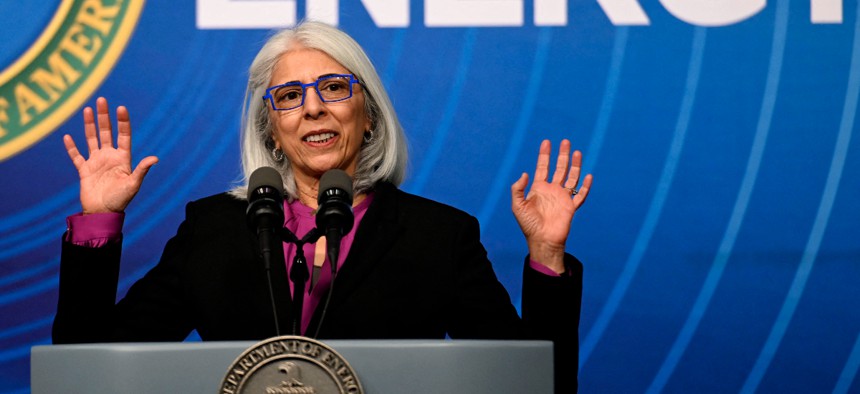US Needs Biotechnology Investment to Avoid Playing Catch-Up in Future, Admin Official Says

Director of the White House Office of Science and Technology Policy Arati Prabhakar speaks during a press conference on December 13, 2022. Prabhakar said during a May 1, 2023 event that biotechnology represents an area for the country to maintain its technological leadership. OLIVIER DOULIERY/AFP via Getty Images
OSTP Director Arati Prabhakar discussed the Biden administration’s ongoing tech priorities following a record-breaking fiscal year 2024 budget request for research and development.
Innovation in emerging technologies—from semiconductor manufacturing to biotechnologies—continues to be a priority within the Biden administration, White House Office of Science and Technology Policy Director Arati Prabhakar said at a talk with the Milken Institute in California on Monday.
During the first part of a two-day event, Prabhakar discussed the administration’s ongoing efforts to spur development in critical sciences and technologies. While she briefly endorsed the role the CHIPS Act will play in cultivating a strong domestic manufacturing and supply chain for semiconductor technologies, Prabhakar noted that the biotechnology market is less developed.
“CHIPS is about the fact that, if [there are] no semiconductors, no information revolution, right? And that's the story we already know, and it's the place where we're playing catch-up,” she said. “But a very different example is biomanufacturing and this is something that's nascent, but it's an opportunity for America to maintain its leadership and not have to play catch-up again.”
She referenced the executive order President Joe Biden signed last fall, which formed a new national program to incentivize domestic biomanufacturing, specifically to create chemical compounds.
With this directive, Prabhakar said that the administration is looking for the U.S. to pivot from traditional biological engineering to create new chemistries and materials, which could lead to innovation that has big implications for sustainable infrastructure.
“Our ability to design biology to create new chemistry and materials and structures has just advanced so dramatically, that now we can actually imagine changing the physical environment around us and moving away from our reliance on petroleum products,” she said.
Prabhakar also addressed the rise of artificial intelligence amid a lack of federal regulations.
“All the work that we're doing across the government, dealing with this amazing new technology, is to understand that to seize its benefits, we have to start by managing its risks,” she said.
She explained that several enforcement agencies, including the Food and Drug Administration, the Department of Justice and the Federal Trade Commission, are working to prevent bias within AI systems used in critical infrastructure.
“We're going to continue to hold corporations accountable when they use AI and make sure that it's not violating civil rights,” Prabhakar said. She further said that in her role as director at OSTP, she is working closely with senior colleagues, and more guidance, ethical values, and information from the Executive Branch will be unveiled.
These comments come less than two months after Biden submitted his FY2024 budget request, which Prabhakar said calls for over $200 billion in federal research and development investment, the largest ever.
“I think it's emblematic of where the whole system is,” she said.






